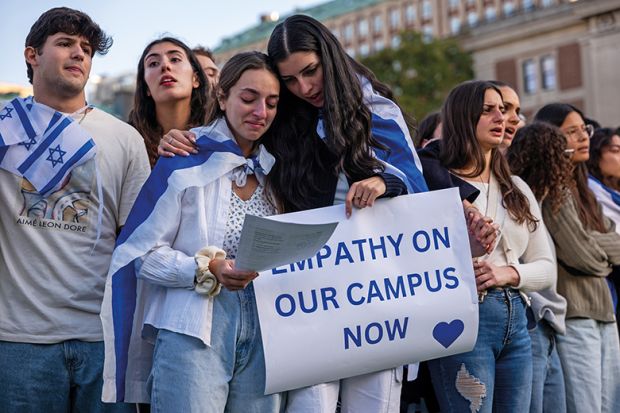Shouting “Fire!” in a crowded theatre is often used as an example of something you cannot do under the First Amendment. Although probably not the best metaphor for exceptions to freedom of speech, it does at least illustrate the point that even in the US free speech has limitations.
The concept of academic freedom, linked to – though also distinct from – wider free speech guarantees such as the First Amendment, also has limitations. What these are or should be can, of course, be difficult to work out. The democratic rationale for free speech guarantees is primarily to restrain government control of ideas, criticism and the press.
From this perspective, it is better to allow the expression of hateful ideas because suppressing them might lead to a slippery slope, ending up in the government banning any idea it does not like. In parallel, the rationales for academic freedom include the risk that scientific enquiry (in its widest sense) could be subverted to serve the agenda of governments. This is not an idle risk: the Soviet Union often subverted disciplines such as psychology to justify political oppression.
Others argue that academic freedom is essential for science to advance because it is only through challenging accepted norms and ideas that we can innovate and develop. For free speech in general and academic free speech in particular, critique of both accepted and new ideas is crucial. If a new idea is bad, objectionable or hateful, giving it the oxygen of free dissemination means that others are also free to evaluate it and to use their free speech rights to critique and even condemn it.
Many argue that it is better for objectionable ideas to be subject to debate in the public square, rather than hidden away, shielded from criticism. Thus, both in law and in the academy, one can argue that it is better not to, for example, ban Holocaust denial, but to subject it to open critique and indeed condemnation. Repressing discussion of Holocaust denial and other objectionable ideas does not offer any guarantees that such ideas will then somehow disappear; rather, it is more likely that they will continue to spread underground, in the shadows, where they cannot be subject to rebuttal.
There is a crucial caveat here. In The Open Society and its Enemies, Karl Popper argued that unlimited tolerance will only lead to the disappearance of intolerance if there are people willing to stand up and counter intolerant ideas by rational argument, so that they are kept in check by public opinion. In other words, democratic free speech ideals only work to promote democracy if there are right-minded people willing to stand up for democratic values. If they don’t, then the project fails.
I would argue that this is what has been happening in the academy in the aftermath of 7 October. There is no democratic position that can justify mutilating babies, decapitating people or hunting down and murdering young people at a music festival. Yet there has been precisely such justification and indeed glorification of murder from the academy. Precious few voices have critiqued or condemned staff and students who have adopted such positions, whether from fellow academics or university leaders.
It is perfectly possible to have a whole range of legitimate positions on the Israel-Palestinian conflict, including mourning loss of life in Gaza and supporting Palestinian self-determination, without justifying Hamas' deliberate murder and mutilation of children. One doesn’t, in fact, have to make any argument about restricting academic freedom in this context. One simply has to recognise that it goes two ways: other academics and, indeed, universities as corporate entities also have free speech rights and, as Popper notes, they have a deep responsibility to exercise them – to stand up and say: "No, this cannot be justified."
Others have argued that this failure of moral courage by the academy signifies, as Carl Heneghan recently noted, the death of scepticism in the academy more widely. In other words, universities in the West, it could be argued, are in the grip of a kind of progressivist “groupthink” whereby certain perspectives within critical theory, influential across the humanities, social sciences and increasingly all the disciplines, have become for many unshakeable orthodoxies. These orthodoxies and the perceived grip they hold on minds in universities mean that actual critical thinking in many domains comes to a halt.
Just as seriously, it also means that the compact between the academy and society – that universities will contribute to democratic values and the pursuit of the “good life” – is broken. Nothing demonstrates this more than the failure of university leaders in particular to stand up and call out the Hamas atrocities for what they were. The ensuing rise of antisemitism on campus is its inevitable corollary.
Joseph Mintz is associate professor in education at UCL. Follow him @jmintzuclacuk.
Register to continue
Why register?
- Registration is free and only takes a moment
- Once registered, you can read 3 articles a month
- Sign up for our newsletter
Subscribe
Or subscribe for unlimited access to:
- Unlimited access to news, views, insights & reviews
- Digital editions
- Digital access to THE’s university and college rankings analysis
Already registered or a current subscriber? Login








